Remember when political risk was something emerging markets investors were paid to take but which developed market investors could safely ignore?
Those were good times, perhaps, but now appear to be long gone.
From the June 23 vote on Britain’s future in or out of the European Union to critical elections in Spain and Italy to the big event of a US presidential election starring one Donald Trump, political risk is a major feature in 2016’s investment landscape.
The question becomes: not do politics matter to outcomes, but do investors in the heretofore most stable jurisdictions have any idea how to price the risks?
In the post-World-War-Two era, political risk in the developed world hasn’t so much been absent, it has been something like a one-way bet going in favor of business and investors. Tariffs have fallen, globalization has increased and offered good opportunities for not just new markets but production cost arbitrage. Politics have generally been benign, at least from an investor’s point of view.
“There are numerous estimates with varying degrees of justification, most of them partisan, regarding the likelihood of the events in question and their economic consequences,” writes Didier Saint-Georges, managing director at French asset manager Carmignac in a note to clients.
“But whatever happens, the important thing is that the risk here is asymmetric: at best, the elections will lead to a status quo; at worst, they could trigger a chain reaction.”
This is exactly the point. Not only have investors become complaisant about the strength and stability of developed market institutions, they are also as a class not really paid to make bets on very difficult-to-predict processes. Rare is the fund manager in developed markets who markets themself on their political savvy, with many taking the position that their job is to pick good companies or identify economies which will “outperform”.
A look at markets in Britain shows that investors do get jumpy about sterling assets when news suggests a growing chance of Brexit, which is generally thought would carry with it a heavy medium-term economic cost. Yet in the US you would be extremely hard put to look at the trading of stocks and government bonds, much less the dollar, and divine that a major party candidate, Trump, appears ready to start a trade war and appears flexible about the wisdom of being too punctilious in honoring one’s debts.
A long way from the Davos consensus
Maybe this is telling us we all might want to cheer up, because perhaps none of it will ever happen. Trump may get thumped, Britain probably will remain within the EU, and Spain, Italy and other euro zone countries will cobble together reforms and governments to keep things not too far from where things now stand.
Marko Papic, chief geopolitical strategist at consultancy BCA Research, thinks that markets have more or less priced the risks of the rise of the anti-establishment parties in Europe, but less so in the English-speaking world.
“A lot of investors believe that what is happening in the US and UK is a temporary flirtation with anti-establishment (politics),” he said.
“In our view this is evidence that the pendulum is swinging from pro-market laissez-faire policies that have been the hallmark of the Anglo-Saxon economies to the far more left-oriented socialist policies of anti-establishment parties.”
And that perhaps is the larger truth of a strange season. While Donald Trump is about as far from the Davos Man consensus of deregulation and globalization as could have been imagined in a major party candidate a year ago, neither can Hillary Clinton, now pushed considerably to the left by Bernie Sanders’ successes, be put neatly into that box either.
Whatever comes next as a result of the earthquake in politics is likely to be slightly less global and to feature slightly more redistribution. That this has costs and benefits is almost beside the point. Economic growth might be hurt, but the movement of cash in the economy and with it inflation might improve due to a redistribution of money downwards.
If politics in developed markets have a big impact on price movements in the next year, it is reasonable to expect investors to begin to demand some extra compensation for wearing that risk.
That’s always been the way in emerging markets: lower multiples because you never know what the next government will do.
And so it may become the way in London, Washington and Paris.
(James Saft is a Reuters columnist. The opinions expressed are his own. At the time of publication he did not own any direct investments in securities mentioned in this article. He may be an owner indirectly as an investor in a fund. You can email him at jamessaft@jamessaft.com)
